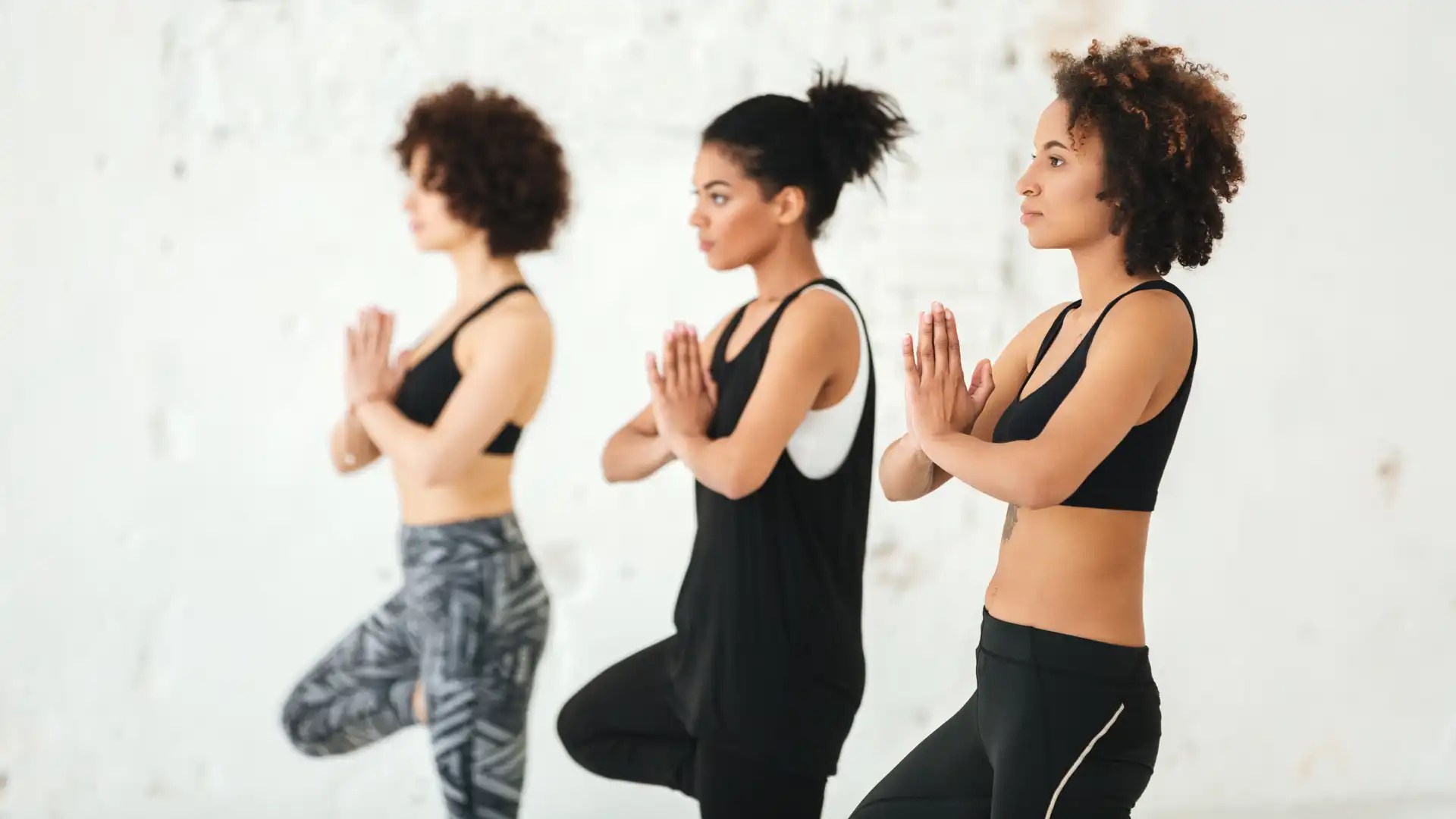Looking for Ways to Cope with Anxiety? How Yoga May Help

In today’s increasingly complex world, stress in all facets of life have overtaken contentment and happiness, resulting in a myriad of health issues, all of which have alienated us from our own true selves.
While the use of prescribed and over-the-counter medications can mitigate some of the health issues and allow us to carry on normally with our busy lives, these quick-fix, short-term solutions can reduce our ability to monitor and focus on our personal health and well-being, and to get closer to our true nature. Thankfully, a yoga practice can do just that.
The Difference between Anxiety and Chronic Anxiety
Anxiety is a normal emotion that most of us experience now and then. It’s the emotion we display commonly at work, before taking a test, when making an important decision, or teaching our very first yoga class. However, chronic anxiety—aka anxiety disorders—are different, as they can cause such distress to life that it interferes with our ability to lead a normal life.
Chronic anxiety is a serious mental illness and is experienced as worry and fear that can be overwhelming and disabling.
Symptoms of Chronic Anxiety:
- Feelings of panic
- Fear and uneasiness
- Problems sleeping
- Shortness of breath
- Heart palpitations
- Not being able to be still and calm
- Muscle tension.
There are many different reasons people suffer from anxiety. It could be related to your upbringing, traumatic life experiences and, in some cases, genetics as well. No matter what the cause, it’s important to look for ways to reduce the level of anxiety as much as possible.
Recent studies have shown that anxiety can also lower life expectancy. In one study, researchers analyzed statistics from several studies involving nearly 70,000 patients and discovered that people with anxiety may suffer from reduced life expectancies after other health and lifestyle factors are taken into account.
While the causal effects are not clear from this study, researchers believe that deterioration in mental and physical health together with the intake of anti-anxiety medications may be primarily responsible for reducing life expectancy in these people.
Yoga Offers More Effective Relief for Anxiety Than Drugs, Study Finds
Yoga practices can help us deal with chronic health issues, and researchers are exploring exactly how specific medical issues—including anxiety disorders—can be alleviated by yoga. In one study, researchers provide a fascinating overview of the effect of yoga on anxiety and depression and in another, which looked more closely at the effect of yoga on anxiety, researchers showed that participating in a two-month yoga class can significantly reduce anxiety in women with anxiety disorders.
In the first study “Effectiveness of yogic techniques in the management of anxiety,” the researchers compared yoga practice with the anti-anxiety drug (diazepam) in anxiety-neurotic outpatients. The data indicated a significant rate of improvement in yoga subjects who completed the prescribed length of yoga practices (five days per week for three months) as compared with the group on drug therapy. Nearly seven percent of yoga subjects were reported to be completely asymptomatic, with no such recovery reports from the drug therapy subjects.
In the second study, researchers showed that subjects with anxiety disorders who participated in a two-month yoga class reported significantly reduced anxiety attacks. In the study “Effects of yoga on depression and anxiety of women,” the researchers randomly assigned women with anxiety disorders into an experimental and a control group. The experimental group (n=34) participated in twice weekly yoga classes of 90-minute duration for two months. The control group (n=31) was assigned to a waiting list and did not receive yoga.
Both groups were evaluated again after the two-month study period. Women who participated in the yoga classes showed a significant decrease in anxiety levels. The results were so striking that the researchers concluded that yoga can be considered as an effective complementary or an alternative method for therapy in the treatment of anxiety disorders.
Researchers believe that yoga may improve the functioning of individuals with anxiety by relieving psychological distress through the release of feel-good chemicals. This increases their mental awareness and helps them to tolerate physical and sensory experiences associated with fear and helplessness.
Benefits of Yoga: Cultivating Contentment
Humans in general are not contented with what they possess and tend to be desirous of some materialistic pleasure. And if these desires do not get fulfilled, it can trigger emotional upheavals, including but not limited to anxiety, fear, worry, depression, discontentment, unhappiness, and loss of mental peace, leading to a disharmonious life.
It can benefit us to cultivate contentment, even if the final outcome of the purpose was unforeseen and unfavorable. It can also mean being happy with what we have rather than being unhappy about what we don’t have. This is a process of growth through all kinds of circumstances.
One of the tenets of the yoga philosophy is to be contented and happy even while experiencing life’s difficulties. Yoga practice can help us establish this healthier frame of mind. While this may seem too easy to be true, the healing power of yoga lies in its simplicity!
Also, read...
Research Studies Document Benefits of Yoga for Depression
Looking for Ways to Cope with Anxiety? How Yoga May Help
Preventing Chronic Disease: Yoga May Alter Gene Expression Linked to Inflammation
Related courses
Breath as Medicine: Yogic Breathing for Vital Aging
Yoga and Myofascial Release: Releasing Chronic Tension with the Bodymind Ballwork Method

Rammohan (Ram) Rao comes from a family of Ayurvedic practitioners and Vedic teachers in India tracing back to the illustrious Vedic-acharya Rishi Kaundinya (although Ram admits he cannot do the Eka pada or Dwi pada Kaundinyasana). With a doctorate in Neuroscience, Ram was a Research Associate Professor at the Buck Institute for Research on Aging. He focused on various aspects of age-associated neurodegenerative diseases with an emphasis on Alzheimer’s disease. In addition, Ram completed the academic training at the California College of Ayurveda (CCA) and received his certification as a Clinical Ayurvedic Specialist. He has been a faculty member of the California College of Ayurveda and teaches in their Nevada City location. Ram is also a dedicated Hatha yoga practitioner and is a Registered Yoga Teacher from Yoga Alliance USA. In his spare time, he offers consultations in YAMP techniques (Yoga, Ayurveda, Meditation & Pranayama). Ram has published several articles in major Yoga/Ayurveda magazines and has been a featured speaker in several national and international meetings and symposia. He is a member of the National Ayurvedic Medical Association (NAMA) and is on the Research Board of the Association of Ayurvedic Professionals of North America (AAPNA).



